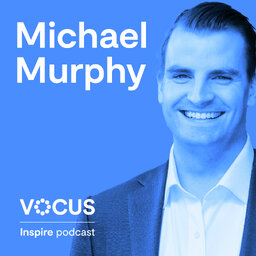From minds to metrics: quantifying the benefits of diverse thinking
Delve into the quantifiable benefits of diverse thinking with Liz Abrahams, APAC Regional Champion Diversity and Inclusion at Infosys. Learn how organisations can measure the positive impact of cognitive diversity on key performance indicators, from revenue growth to employee engagement and more.
In 1 playlist(s)
Vocus Inspire
Brilliant ideas for business: In this podcast, we dive head-first into what’s on the minds of Austra…Social links
Follow podcast
Recent clips

AI with Michael McQueen
31:21

Cybersecurity with Michael Murphy
18:34

Vocus Podcast with Jürgen Hatheier - The Impact of AI
25:16
 Vocus Inspire
Vocus Inspire